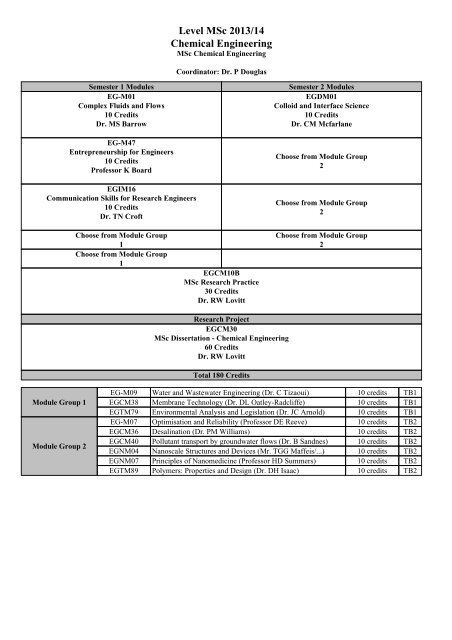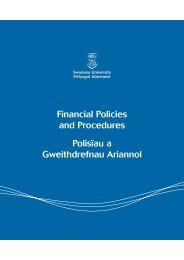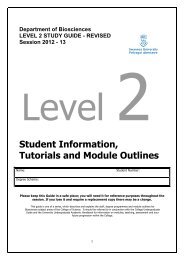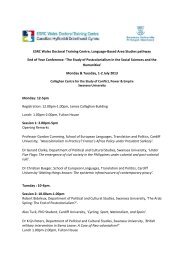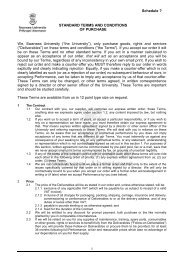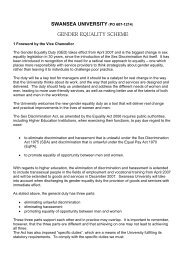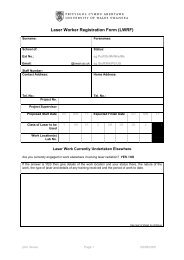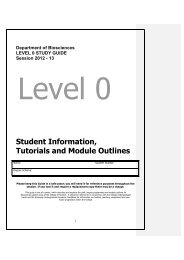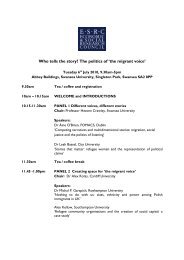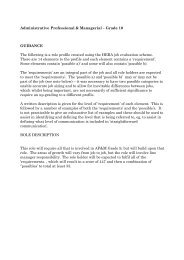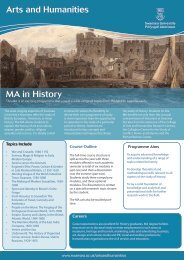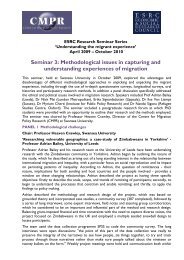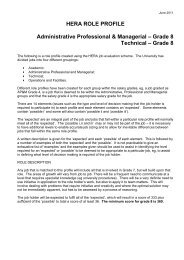Level MSc 2012/13 Chemical Engineering - Swansea University
Level MSc 2012/13 Chemical Engineering - Swansea University
Level MSc 2012/13 Chemical Engineering - Swansea University
Create successful ePaper yourself
Turn your PDF publications into a flip-book with our unique Google optimized e-Paper software.
<strong>Level</strong> <strong>MSc</strong> 20<strong>13</strong>/14<br />
<strong>Chemical</strong> <strong>Engineering</strong><br />
<strong>MSc</strong> <strong>Chemical</strong> <strong>Engineering</strong><br />
Coordinator: Dr. P Douglas<br />
Semester 1 Modules<br />
EG-M01<br />
Complex Fluids and Flows<br />
10 Credits<br />
Dr. MS Barrow<br />
EG-M47<br />
Entrepreneurship for Engineers<br />
10 Credits<br />
Professor K Board<br />
EGIM16<br />
Communication Skills for Research Engineers<br />
10 Credits<br />
Dr. TN Croft<br />
Semester 2 Modules<br />
EGDM01<br />
Colloid and Interface Science<br />
10 Credits<br />
Dr. CM Mcfarlane<br />
Choose from Module Group<br />
2<br />
Choose from Module Group<br />
2<br />
Choose from Module Group<br />
1<br />
Choose from Module Group<br />
1<br />
EGCM10B<br />
<strong>MSc</strong> Research Practice<br />
30 Credits<br />
Dr. RW Lovitt<br />
Choose from Module Group<br />
2<br />
Research Project<br />
EGCM30<br />
<strong>MSc</strong> Dissertation - <strong>Chemical</strong> <strong>Engineering</strong><br />
60 Credits<br />
Dr. RW Lovitt<br />
Total 180 Credits<br />
Module Group 1<br />
Module Group 2<br />
EG-M09 Water and Wastewater <strong>Engineering</strong> (Dr. C Tizaoui) 10 credits TB1<br />
EGCM38 Membrane Technology (Dr. DL Oatley-Radcliffe) 10 credits TB1<br />
EGTM79 Environmental Analysis and Legislation (Dr. JC Arnold) 10 credits TB1<br />
EG-M07 Optimisation and Reliability (Professor DE Reeve) 10 credits TB2<br />
EGCM36 Desalination (Dr. PM Williams) 10 credits TB2<br />
EGCM40 Pollutant transport by groundwater flows (Dr. B Sandnes) 10 credits TB2<br />
EGNM04 Nanoscale Structures and Devices (Mr. TGG Maffeis/...) 10 credits TB2<br />
EGNM07 Principles of Nanomedicine (Professor HD Summers) 10 credits TB2<br />
EGTM89 Polymers: Properties and Design (Dr. DH Isaac) 10 credits TB2
EG-M01 Complex Fluids and Flows<br />
Credits: 10 Session: 20<strong>13</strong>/14 Semester 1 (Sep-Jan Modular)<br />
Module Aims: This module describes advanced aspects of transport processes involving non-Newtonian materials<br />
with particular reference to viscoelastic systems and the Rheological properties of other time-dependent materials. The<br />
module considers methods for the characterisation of complex fluids and associated engineering calculations for<br />
pipeline transport and other flow scenarios encountered in manufacturing processes.<br />
Pre-requisite Modules:<br />
Co-requisite Modules:<br />
Incompatible Modules:<br />
Format: Lectures (20h); Directed private study (80h)<br />
Lecturer(s): Dr. MS Barrow<br />
Assessment: Examination 1 (75%)<br />
Assignment 1 (10%)<br />
Assignment 2 (15%)<br />
Assessment Description: Coursework 1 (10%): Individual assignment<br />
Coursework 2 (15%): Individual assignment<br />
Guidance will be issued via Blackboard.<br />
Failure Redemption: Eligibility for the redemption process is subject to the degree scheme and the associated<br />
progression/completion criteria; where permitted, a supplementary examination will form 100% of the mark.<br />
Assessment Feedback: Feedback will be available from the lecturer.<br />
Module Content: Non-Newtonian fluid mechanics, including aspects of:<br />
Applications of industrial rheology<br />
Definition of shear viscosity, shear stress and shear rate.<br />
Rotational viscometry (non-oscillatory testing)<br />
Yield Stress, Bingham plastic materials with particular emphasis on flow behavior in concentric cylinder geometries.<br />
Poiseulle Flow. Pumping of non-Newtonian fluids including:<br />
Power law fluids, Bingham plastics, yield pseudoplastics, Hershel Bulkley fluids.<br />
Time-dependent behavior of fluids, thixotropy, rheopexy.<br />
Rheological models including : Power-law, Carreau, Cross, Ellis and Casson fluid models.<br />
The Boltzmann Superposition Principle. Viscoelasticity – Maxwell, Kelvin-Voigt and Burgers models. Relaxation<br />
time, Retardation time.<br />
Time effects in viscoelastic flows- Deborah number, Weissenberg number.<br />
Small amplitude oscillatory flow, complex shear modulus. Oscillatory flow – Maxwell model.<br />
Measurement of rheological parameters using different viscometer/rheometer systems.<br />
Intended Learning Outcomes: The student should be able to:<br />
Employ basic calculus to derive key mathematical relationships. Describe experimental data sets using regression<br />
analysis and model equations. Understand non-Newtonian flow and viscoelastic systems. Visualise non-Newtonian<br />
fluid flow. Describe pressure drops in flow situations. Use flow models to describe non-Newtonian flow behaviour.<br />
Describe viscoelastic solid and viscoelastic liquid models in oscillatory shear flow and stress relaxation. Understand<br />
sol-gel transition phenomena in terms of viscoelastic theory (linear) and the relaxation time spectrum. Describe<br />
qualitatively and quantitatively non-Newtonian flow in simple geometries.<br />
Reading List: Coulson & Richardson, <strong>Chemical</strong> <strong>Engineering</strong> Volume 1 (6th Ed), Butterworth-Heinemann,<br />
1999.ISBN: 0-7506-4444-3<br />
Additional Notes: This module contains coursework: The college of <strong>Engineering</strong> has a ZERO TOLERANCE penalty<br />
policy for the late submission of all coursework.
EG-M07 Optimisation and Reliability<br />
Credits: 10 Session: 20<strong>13</strong>/14 Semester 2 (Jan - Jun Modular)<br />
Module Aims: This module provides an introduction to important techniques of optimisation and reliability that may<br />
be used across a broad range of engineering disciplines.<br />
Numerical examples are employed to illustrate concepts.<br />
Pre-requisite Modules:<br />
Co-requisite Modules:<br />
Incompatible Modules:<br />
Format:<br />
Lectures 20 hours;<br />
Example classes/surgeries 10 hours;<br />
Directed private study 70 hours<br />
Lecturer(s): Professor DE Reeve<br />
Assessment: Examination 1 (70%)<br />
Coursework 1 (15%)<br />
Coursework 2 (15%)<br />
Assessment Description: Exam - closed book exam<br />
Coursework 1 - calculation problem. This is an individual piece of coursework<br />
Coursework 2 - calculation problem. This is an individual piece of coursework<br />
Failure Redemption: A supplementary examination will form 100% of the module mark.<br />
Assessment Feedback: Written feedback on coursework + opportunity for further verbal feedback around lecture<br />
discussions.<br />
Exam - written feedback.<br />
Module Content: Indicative syllabus content:<br />
1. Statement of the optimisation problem; objective function; design vector; types of constraint; classification of<br />
optimisation problem.<br />
2. Least squares techniques<br />
3. Maximum likelihood method<br />
4. One-Dimensional Minimisation Methods. Direct and indirect methods:unrestricted search; dichotomous search;<br />
golden section method; quadratic interpolation; Newton's procedures.<br />
5. The Hessian; Concavity and convexity<br />
6. Multidimensional Minimisation Problems - direct methods such as:Taxi-cab; conjugate search procedures; Powell's<br />
method<br />
7. Multidimensional Minimisation Problems - indirect methods such as: Steepest descent method; Newton's method.<br />
8. Concepts in reliability theory<br />
9. Extreme value distributions<br />
10. First order reliability methods.<br />
Intended Learning Outcomes: The student should:<br />
• Understand and be able to set up and carry out the necessary calculations for univariate unimodal optimisation<br />
problems<br />
• Be able to use search techniques to determine the optima of unconstrained multivariable systems<br />
• Understand and be able to set up and carry out the necessary calculations for First Order Reliability problems<br />
Reading List: T F Edgar and D M Himmelblau, Optimisation of <strong>Chemical</strong> Processes, McGraw-Hill.ISBN: 0-07-<br />
018991-9<br />
James, Advanced modern engineering mathematics, Addison Wesley, 1993.ISBN: 0-201-56519-6<br />
Matousek, understanding and using linear programming, springer, 2007.ISBN: 978-3-540-30697-9<br />
ReeveD, Risk and reliability: coastal and hydraulic engineering, Spon Press, 2009.ISBN: ISBN<strong>13</strong>: 978-0-415-46755-1<br />
(hardback) / ISBN<strong>13</strong>: 978-0-203-89552-8 (ebook)<br />
Additional Notes: The course assumes good A-level mathematical skills. In addition candidates without good<br />
understanding of partial differentiation, Taylor series expansion, matrices, eigenvalues and introductory probability<br />
theory will be expected to undertake the necessary supplementary effort to attain this knowledge outside the demands<br />
of this module.<br />
Failure to sit an examination or submit work by the specified date will result in a mark of 0% being recorded. The<br />
College of <strong>Engineering</strong> has a ZERO TOLERANCE penalty policy for late submission of all coursework and<br />
continuous assessment.
EG-M09 Water and Wastewater <strong>Engineering</strong><br />
Credits: 10 Session: 20<strong>13</strong>/14 Semester 1 (Sep-Jan Modular)<br />
Module Aims: This module aims to deliver a working knowledge of water and wastewater treatment processes. The<br />
module will<br />
cover various physical, chemical and biological unit operations used in the treatment of water and wastewater. This<br />
module will particularly emphasise the design and operational issues related to these unit operations. Moreover, the<br />
module will cover regulatory aspects related to water quality and requirements for water and wastewater treatment.<br />
Pre-requisite Modules:<br />
Co-requisite Modules:<br />
Incompatible Modules:<br />
Format:<br />
Lectures 20 hours<br />
Example classses 10 hours<br />
Directed private study 70 hours<br />
Lecturer(s): Dr. C Tizaoui<br />
Assessment: Examination (50%)<br />
Other (Coursework) (50%)<br />
Assessment Description: 2 hour exam in January (50%)<br />
Coursework (
Additional Notes: Available to visiting and exchange students.<br />
The College of <strong>Engineering</strong> has a ZERO TOLERANCE penalty policy for late submission of all coursework and<br />
continuous assessment.
EG-M47 Entrepreneurship for Engineers<br />
Credits: 10 Session: 20<strong>13</strong>/14 Semester 1 (Sep-Jan Modular)<br />
Module Aims: To establish the principles of entrepreneurship and the role engineers have in successful business<br />
enterprises.<br />
Pre-requisite Modules:<br />
Co-requisite Modules:<br />
Incompatible Modules:<br />
Format:<br />
Lectures 20 hours<br />
Example classes / Laboratory work 10 hours<br />
Directed private study 76 hours<br />
Lecturer(s): Professor K Board<br />
Assessment: Group Work - Coursework (80%)<br />
Coursework 1 (20%)<br />
Assessment Description: The group assignment will require application of the concepts of entrepreneurship. The<br />
assignment will require the delivery of a presentation and the submission of a business plan.<br />
The individual assignment will consist of a 600 word essay.<br />
Failure Redemption: 100% coursework.<br />
Assessment Feedback: Mainly through the group interviews held at the end of the course.<br />
Module Content: What is an entrepreneur and why enterprise matters; the six dimensions of entrepreneurship,<br />
structure and presentation of opportunities, sources and structure of finance, people and teams.<br />
How enterprise is managed internationally, managing early and long-term growth, harvesting and buy-out, sustaining<br />
the flow of ideas within a company, case-studies.<br />
Intended Learning Outcomes:<br />
After completing this module you should be able to:<br />
• Describe how opportunities are identified and a business plan is generated in order to get started<br />
• List the sources of finance that exist and how they are structured<br />
• Analyse the role of people and what makes a winning team<br />
• Discuss a case history that lead to success<br />
• Explain how early growth is managed<br />
• Analyse how failure can occur and how to guard against it<br />
• Explain how enterprise can be sustained within an organisation as it grows<br />
Reading List: Birley and Muzyka, Mastering Enterprise, Financial Times Publication, 1997.ISBN: 027363031<br />
Bridge, O'Neill and Martin, Understanding Enterprise, Entrepreneurship and Small Business, Palgrave Macmillan,<br />
2008.ISBN: 0230552706<br />
Additional Notes: The College of <strong>Engineering</strong> has a ZERO TOLERANCE penalty policy for late submission of all<br />
coursework and continuous assessment<br />
Related assignments are used to assess this module.
EGCM10B <strong>MSc</strong> Research Practice<br />
Credits: 30 Session: 20<strong>13</strong>/14 Semester 1 and 2 (Sep-Jun Modular)<br />
Module Aims: A Masters <strong>Level</strong> course to deliver knowledge and skills on how to write and submit scientific papers<br />
and reports. The course requires that the students prepare a draft publication of journal quality. The whole process is<br />
examined from the presentation of data in a suitable form for publication to the final draft that is suitable for electronic<br />
submission. In addition the students undertake up to 20 hours lab based experimental team project on pilot equipment<br />
where appropriate. The research data is then used to write a joint report of the work, which will be assessed.<br />
For the paper writing, original data is provided and the students must put this in a suitable manuscript. They must<br />
make a reasoned choice of journal; then follow the format required by that specified Journal and its instructions. They<br />
will be asked to write a concise introduction to the paper with an updated literature survey. They must present results<br />
appropriately and of the correct quality and then describe and discuss these.<br />
Pre-requisite Modules:<br />
Co-requisite Modules:<br />
Incompatible Modules:<br />
Format: 50<br />
Lecturer(s): Dr. RW Lovitt<br />
Assessment: Other (Coursework) (100%)<br />
Assessment Description: Assignment<br />
1. Introduction and c.v. presentation. This is an individual piece of coursework<br />
Assignment 2. World issues in engineering (presentation and report). This coursework is conducted and assessed in<br />
groups<br />
Assignment 3 Literature survey. Detailed and critcal assessment of research problem or topic. This is an individual<br />
piece of coursework and the candidate will get a choice of topics<br />
Assignment 4. Practical report. This coursework is conducted and assessed in groups<br />
Assignment 5. Paper writting. This is an individual piece of coursework<br />
Failure Redemption: There is possible condonment for narrow fails. Resubmission of individually assessed<br />
coureswork in the summer.<br />
Assessment Feedback: Individual feedback on marked assigments.<br />
Module report.<br />
Module Content: 1. The preparation of a presentation in small groups (2 lectures) (5% marks)<br />
2. The preparation of a substantial literature survey (up to 5000 words) on a topic in chemical or biochemical<br />
engineering and a presentation of 15 minutes duration of the survey (2 lectures) (40% marks)<br />
3. The preparation of a draft publication of journal quality. The whole process is examined from the presentation of<br />
data in a suitable form for publication to the final draft that is suitable for electronic submission. For the paper writing<br />
- original data is provided and the students must put this in a suitable technical context, they must justify the choice of<br />
journal; then follow the format required by that specified Journal and its instructions. This will include an abstract,<br />
graphical abstract, research highlights, a concise manuscript including introduction to the paper with an updated<br />
literature survey and appropriate referencing. They must present results appropriately, of the correct quality and then<br />
describe and discuss these. A conclusion section must also be presented. Finally the paper should finish with correctly<br />
formated references (2000-4000 words) (6 lectures) (40%).<br />
4. The students undertake a lab based experimental team project (up to 20 hours) using pilot scale equipment. The<br />
information generated is recorded in a laboratory notebook along with the experimental procedures and methods used.<br />
This data is then used to write a joint report of the work. This is then assessed (15% total mark).<br />
5. Tutorials (10 hours)
Intended Learning Outcomes: The student will be able to gather, write and present data derived from several<br />
sources:<br />
- be able to work on a joint presentation.<br />
- be able to organise and write a substancial literature survey paper and present it orally.<br />
- be able to organise and write a technical paper.<br />
- be able to keep a good lab book and produce a lab report.<br />
Reading List:<br />
Additional Notes: Zero tolerance on assignments is applied.
EGCM30 <strong>MSc</strong> Dissertation - <strong>Chemical</strong> <strong>Engineering</strong><br />
Credits: 60 Session: 20<strong>13</strong>/14 Summer (July - September Modular)<br />
Module Aims: The dissertation study will generally be carried out on a research topic associated with, and supervised<br />
by, a member of staff in the SPEC, CCFP or Cwater. Study for the dissertation, which may be based on practical,<br />
industrial, or literature work, or any combination of these, is carried out over a period of about 12 weeks, with the<br />
dissertation submitted at the end of September.<br />
Pre-requisite Modules:<br />
Co-requisite Modules:<br />
Incompatible Modules:<br />
Format:<br />
Typically 1 hour per week i.e. 10-15 hrs total contact time. Each student is to be supervised in<br />
accordance with the <strong>University</strong>'s Policy on Supervision, with a minimum of three meetings held. A<br />
careful record should be kept, agreed between supervisor and student, of all such formal meetings,<br />
including dates, action agreed and deadlines set.<br />
Lecturer(s): Dr. RW Lovitt<br />
Assessment: Other (Coursework) (100%)<br />
Assessment Description: The research project and dissertation forms Part Two of the Masters degree. Information<br />
about dissertation preparation and submission can be found at:<br />
http://www.swan.ac.uk/registry/academicguide/assessmentandprogress/dissertationpreparationsubmission/<br />
Additionally, students should refer to:<br />
http://www.swan.ac.uk/registry/academicguide/postgraduatetaughtawardsregulations/postgraduatetaughtmastersde<br />
grees/17submissionofdissertation/<br />
The word limit is 20,000. This is for the main text and does not include appendices (if any), essential footnotes,<br />
introductory parts and statements or the bibliography and index.<br />
Each student is to submit two soft bound copies and an electronic copy of the dissertation (CD with dissertation in<br />
Pdf format) to the College Postgraduate Administration Team by the deadline of 30th September. Each copy must<br />
contain:<br />
• a statement that it is being submitted in partial fulfilment of the requirements for the degree;<br />
• a summary of the dissertation not exceeding 300 words in length;<br />
• a statement, signed by you, showing to what extent the work submitted is the result of your own investigation.<br />
Acknowledgement of other sources shall be made by footnotes giving explicit references. A full bibliography should<br />
be appended to the work;<br />
• a declaration, signed by you, to certify that the work has not already been accepted in substance for any degree,<br />
and is not being concurrently submitted in candidature for any degree; and<br />
• a signed statement regarding availability of the thesis.<br />
The dissertation is marked by the supervisor and another member of staff and sent to an External Examiner for<br />
moderation. If necessary a further member of staff may be involved, if there are disparate views. An Internal Exam<br />
Board is then held to confirm the mark. Finally, all marks are ratified at the <strong>University</strong> Postgraduate Taught<br />
Examination Board.<br />
Failure Redemption: Candidates who fail the dissertation are given an opportunity to resubmit the dissertation within<br />
3 months of the result of the examination if a full-time student or 6 months for part-time students. Such students will<br />
be given one formal feedback session, including written feedback on the reasons for failure, immediately following<br />
confirmation of the result by the <strong>University</strong> Postgraduate Taught Examination Board. The opportunity to resubmit will<br />
only be offered to students who submit a dissertation and are awarded a fail. Those candidates who do not submit a<br />
dissertation will not be offered a resubmission opportunity.<br />
Assessment Feedback: The student will receive feed back in the form of:<br />
An assessment of their project drafting skills, from the supervisor during the planning and drafting of the dissertation.<br />
An assessment marksheet that includes marks for specific aspects (Understanding, qualitative and quantitative aspects,<br />
presentation) of the dissertation plus an overall comment on the specific aspect of the dissertation by the assessors.<br />
A feedback session will be given to any student who fails their dissertation and is permitted by the Award Board to<br />
resubmit their work.
Module Content: The dissertation study will generally be carried out on a research topic associated with, and<br />
supervised by, a member of staff in the SPEC or Cwater. Study for the dissertation, which may be based on practical,<br />
industrial, or literature work, or any combination of these, is carried out over a period of about 12 weeks, with the<br />
dissertation being submitted at the end of September. Preparatory work on the dissertation may take place during Part<br />
One of the programme but students will only be permitted to submit their dissertation following successful completion<br />
of Part One. The student will meet regularly with the supervisor to ensure that the project is well developed and<br />
organised. Progress will be monitored.<br />
Intended Learning Outcomes: On completion of this module, students should have the ability to:<br />
• investigate a research topic in detail;<br />
• formulate research aims;<br />
• devise and plan a research strategy to fulfil the aims;<br />
• carry out research work - undertake a literature search, a laboratory based or computer based investigation or a<br />
combination of these;<br />
• gather, organize and use evidence, data and information from a variety of primary and secondary sources;<br />
• critically analyse information;<br />
• make conclusions supported by the work and identify their relevance to the broader research area;<br />
• resolve or refine a research problem, with reasoned suggestions about how to improve future research efforts in<br />
the field; and<br />
• produce a report (dissertation), with the findings presented in a well organised and reasoned manner.<br />
Reading List:<br />
Additional Notes: This is a good opportunity for the student to specialise and explore a specific topic related to the<br />
masters degree. This scope and feasibility can be determined with consultation with the academic staff and the<br />
resources available.<br />
The College of <strong>Engineering</strong> has a ZERO TOLERANCE penalty policy for late submission of all coursework and<br />
continuous assessment.<br />
If an extension is deemed appropriate a Postgraduate Taught Masters 'Application for Extension to the Submission<br />
Deadline/ Period of Candidature' Form will need to be submitted as follows:<br />
• 31 August – deadline for Part Two students (non-resit students)<br />
• 8 November – deadline for Part Two Students (students who had resits)
EGCM36 Desalination<br />
Credits: 10 Session: 20<strong>13</strong>/14 Semester 2 (Jan - Jun Modular)<br />
Module Aims: Desalination is an important process in the management of water resources and it has a large societal,<br />
economic and environmental impact. This module will give engineering students a solid grounding in desalination and<br />
related separation processes. This will prove invaluable for a future career in many areas of engineering.<br />
Pre-requisite Modules:<br />
Co-requisite Modules:<br />
Incompatible Modules:<br />
Format:<br />
Lectures 20 hours<br />
Design classes/tutorials 10 hours<br />
Directed private study 70 hours<br />
Lecturer(s): Dr. PM Williams<br />
Assessment: Examination 1 (75%)<br />
Coursework 1 (10%)<br />
Coursework 2 (15%)<br />
Assessment Description: Examination:<br />
End of year examination accounting for 75% of the total course mark<br />
Coursework:<br />
Coursework 1: Tutorial sheet with various numerical problems for 10% of the total course mark.<br />
This is an individual piece of coursework.<br />
Coursework 2: Project on issue with desalination (either essay/excel project) 15% of the total course mark.<br />
This is an individual piece of coursework.<br />
Failure Redemption: A supplementary examination will form 100% of the module mark.<br />
Assessment Feedback: Exam feedback will be given via exam results and the exam feedback forms available on the<br />
<strong>Swansea</strong> <strong>University</strong> intranet.<br />
Module Content: 1. Introduction: Resources and Need for Water desalination; Composition of Seawater; Definition<br />
and Classification of Industrial Desalination Processes.<br />
2. Single Effect Evaporation: Single Effect Evaporation; Evaporators; Single Effect Thermal Vapour Compression;<br />
Single Effect Mechanical Vapour Compression; Single Effect Absorption Vapour Compression; Single Effect<br />
Adsorption Vapour Compression.<br />
3. Multiple Effect Evaporation: Forward Feed Multiple Effect Evaporation; Parallel Feed Multiple Effect Evaporation.<br />
4. Multi Stage Flash Distillation: MSF; Flashing Stage; Once through MSF; Brine through MSF; MSF with Thermal<br />
Vapour Compression; MSF with Brine Mixing.<br />
5. Reverse Osmosis: Elements of membrane Separation; Performance Parameters; RO Membranes; Membrane<br />
Modules; Design of RO Systems; Case studies; RO Feed Treatment, Biofouling and Membrane Cleaning.<br />
6. Alternative methods of desalination.<br />
Intended Learning Outcomes: After completing this module students should be able to:<br />
- Demonstrate a systematic understanding of different desalination systems.<br />
- Apply theory critically to analyse the mechanisms of desalination technologies.<br />
- Make critical evaluation and appreciation of the different thermal and RO membrane modules used in desalination<br />
industry.<br />
- Decide on a strategy for which process (or combination of processes) to implement a desalination process.<br />
- Formulate mathematical models for mass and heat transfer in thermal desalination.<br />
- Develop flowsheeting and detailed design of thermal and RO membrane systems.<br />
Reading List: H. T. El-Dessouky and H.M. Ettouney, Fundamentals of Salt Water Desalination, Elsevier,<br />
2002.ISBN: 9780080532127<br />
Mark Wilf, The Guidebook to Membrane Desalination Technology, Balaban Desalination Publications, 2007.ISBN:<br />
0866890653<br />
Roya Sheikholeslami, Fouling in Membranes and thermal Units, Balaban Desalination Publications, 2007.ISBN:<br />
0866890661<br />
Additional Notes: Available to visiting and exchange students with chemical engineering background.<br />
The College of <strong>Engineering</strong> has a ZERO TOLERANCE penalty policy for late submission of all coursework and<br />
continuous assessment.
EGCM38 Membrane Technology<br />
Credits: 10 Session: 20<strong>13</strong>/14 Semester 1 (Sep-Jan Modular)<br />
Module Aims: A Masters <strong>Level</strong> course to deliver a working knowledge of liquid phase membrane separation<br />
processes. This will include a detailed understanding of current membrane fabrication techniques to produce<br />
polymeric hollow fibres and flat sheet membranes and subsequent production of tubular and spiral wound modules.<br />
Ceramic membrane production will also be considered. The design, construction and optimisation of membrane plants<br />
will be considered with specific emphasis placed on configuration. A detailed understanding of membrane<br />
characterisation techniques will be developed, including SEM, AFM, particle sizing, zeta potential measurement,<br />
rejection and flux experimentation. The specific operations of membrane microfiltration, ultrafiltration, nanofiltration<br />
and reverse osmosis will be investigated and mathematical descriptions will be developed. The course will conclude<br />
with a series of practical case studies detailing current applications of membrane processes and scope for future<br />
development.<br />
Pre-requisite Modules: EG-100; EG-200<br />
Co-requisite Modules: EGCM36; EGDM01<br />
Incompatible Modules:<br />
Format: Lectures 20 hours; Example classes 10 hours; Directed private study 70 hours<br />
Lecturer(s): Dr. DL Oatley-Radcliffe<br />
Assessment: Examination 1 (100%)<br />
Assessment Description: Standard format College of <strong>Engineering</strong> examination.<br />
Coursework will be issued in line with the learning activities and representative of the lecture materials. Where<br />
possible, coursework will reflect current affairs in Membrane Technology. All coursework is issued individually and<br />
should be completed individually. Coursework will be peer reviewed in tutorial classes and feedback issued.<br />
Failure Redemption: A supplementary examination will form 100% of the module mark.<br />
Assessment Feedback: Informal feedback will be provided during lectures and examples classes. Students will<br />
receive peer review on completion of class tutorials. Formal feedback will be provided following completion of the<br />
final exam in line with standard College of <strong>Engineering</strong> protocols.<br />
Module Content: Introduction: introduction to membrane processes, classification of membrane processes, the<br />
filtration spectrum, the nature of synthetic membranes, fabrication processes, molecular weight cut off, module design<br />
and plant configuration<br />
Microfiltration: introduction to frontal and cross flow filtration, development of knowledge and understanding of solid<br />
liquid separations and cake filtration, general membrane equations and adaptation to cake filtration, calculation of<br />
cake properties, time of filtration, bed depth and process optimisation, case studies<br />
Ultrafiltration: introduction to ultrafiltration processes, mass transfer and concentration polarisation effects, simple gel<br />
theory, osmotic pressure effects, effects of membrane charge, optimisation of separations, case studies<br />
Nanofiltration: introduction to nanofiltration processes, equilibrium partitioning, pore models for neutral solute<br />
rejection, effects of membrane charge, confinement issues and effects on physical properties, pore size distributions,<br />
case studies<br />
Reverse Osmosis: what is osmosis, introduction to reverse osmosis, the solution diffusion mechanism of transport,<br />
case studies<br />
Optimisation: membrane characterisation - methods and equipment, process stream characterisation - methods and<br />
equipment, rapid process feasibility studies, experimental requirements, process improvements, pre-treatments, case<br />
studies<br />
Intended Learning Outcomes: After completing this module students should be able to:<br />
Clearly define and differentiate between the different liquid phase pressure driven membrane separation processes;<br />
Understand and describe the mechanisms of separation for each of the different processes; Describe the different<br />
membrane modules available and provide examples of `best use'; Understand membrane morphology and resulting<br />
hydraulic resistance leading to low, medium and high pressure requirements of the different processes; Decide on a<br />
strategy for which process (or combination of processes) to implement in order to achieve a particular separation;<br />
Provide a clear description and mathematical formulation of mass transfer effects in the colloidal region; Apply<br />
mathematical descriptions of the processes for design and optimisation purposes; Design `high level' filtration<br />
processes across the spectrum of MF, UF, NF, and RO<br />
Reading List: Coulson and Richardson, <strong>Chemical</strong> <strong>Engineering</strong>, Vol. 2, Butterworth-Heinemann.ISBN: 0-7506-4445-<br />
1<br />
Strathmann, Introduction to Membrane Science and Technology, Wiley.ISBN: 978-3-527-32451-4<br />
Additional Notes: The College of <strong>Engineering</strong> has a ZERO TOLERANCE penalty policy for late submission of all<br />
coursework and continuous assessment.<br />
No prior knowledge of membranes or membrane systems is required.
EGCM40 Pollutant transport by groundwater flows<br />
Credits: 10 Session: 20<strong>13</strong>/14 Semester 2 (Jan - Jun Modular)<br />
Module Aims: This module focuses on the physical mechanisms that govern groundwater flow through porous<br />
media, the transport of pollutants, and geochemical interactions between solutes and the solid matrix.<br />
Pre-requisite Modules:<br />
Co-requisite Modules:<br />
Incompatible Modules:<br />
Format:<br />
16 hours lectures.<br />
4 hours example classes/tutorials.<br />
80 hours directed private study.<br />
Lecturer(s): Dr. B Sandnes<br />
Assessment: Coursework 1 (25%)<br />
Examination 1 (75%)<br />
Assessment Description: Coursework: Study of pollutant transport using simulation package. Report worth 25 % of<br />
mark. Individual piece of coursework.<br />
Written exam, 75 % of mark, closed book.<br />
Failure Redemption: A supplementary examination will form 100% of the module mark.<br />
Assessment Feedback: Informal feedback will be provided during lectures and examples classes. Feedback on<br />
coursework will be given as written notes and informal feedback. Formal feedback following completion of exam will<br />
be provided in line with standard College of <strong>Engineering</strong> protocols.<br />
Module Content: - Introduction: Ground water, the hydrological cycle<br />
- Characteristics of the porous medium and fluid<br />
- Darcy flow in saturated porous media<br />
- Role of diffusion, dispersion and anisotropy in environmental flows<br />
- Geochemical interactions<br />
- Carbonates and carbon dioxide<br />
- Pollutant transport<br />
- Numerical modelling of transport<br />
- Multiphase flows<br />
Intended Learning Outcomes: After completing this module students should be able to:<br />
1. Demonstrate an understanding of how flows in porous media play a fundamental role in a range of environmental<br />
and engineered processes.<br />
2. Demonstrate detailed knowledge of how the properties of the fluid and the porous media govern the flow<br />
behaviour.<br />
3. Evaluate the transport and fate of environmental pollutants subjected to groundwater flows.<br />
4. Demonstrate knowledge of common geochemical reactions involving solutes carried by environmental flows.<br />
5. Independently implement simulation models to quantify hydrological transport geochemical reactions of pollutants.<br />
6. Critically assess model results and how they relate to real world problems.<br />
7. Present results in scientific report.<br />
(1 - 4 assessed in exam and coursework, 5 - 7 assessed using coursework)<br />
Reading List: Appelo and Postma, Geochemistry, groundwater and pollution, CRC Press, 2005.ISBN: 0415364280<br />
Charbeneau, Groundwater Hydraulics and Pollutant Transport, Waveland Press, 2000.ISBN: 978-1-57766-479-6<br />
Additional Notes: Available to visiting and exchange students.<br />
The College of <strong>Engineering</strong> has a ZERO TOLERANCE penalty policy for late submission of all coursework and<br />
continuous assessment<br />
As this is a masters level module, it is expected that students demonstrate independent study, and seek out and extract<br />
relevant information from a range of available sources.
EGDM01 Colloid and Interface Science<br />
Credits: 10 Session: 20<strong>13</strong>/14 Semester 2 (Jan - Jun Modular)<br />
Module Aims: Students will gain an in-depth understanding of the properties of colloids and their importance in<br />
engineering and medicine.<br />
Pre-requisite Modules:<br />
Co-requisite Modules:<br />
Incompatible Modules:<br />
Format:<br />
Lectures: 20 hours<br />
Example classes: 5 hours<br />
Directed Private Study: 75 hours<br />
Lecturer(s): Dr. CM Mcfarlane<br />
Assessment: Examination 1 (75%)<br />
Coursework 1 (10%)<br />
Coursework 2 (15%)<br />
Assessment Description: Examination:<br />
End of year examination accounting for 75% of the total course mark<br />
Coursework:<br />
Coursework 1: Tutorial sheet with various numerical problems for 10% of the total course mark.<br />
This is an individual piece of coursework.<br />
Coursework 2: Critique of a published paper involving colloid science topics for 15% of the total course mark.<br />
This is an individual piece of coursework.<br />
Failure Redemption: A supplementary examination will form 100% of the module mark.<br />
Assessment Feedback: Exam feedback will be given via exam results and the exam feedback forms available on the<br />
<strong>Swansea</strong> <strong>University</strong> intranet.<br />
Coursework feedback will be given via coursework marks, individual written comments on the coursework scripts and<br />
provision of model answers on the Blackboard website.<br />
Module Content: Module content: [lecture hours]<br />
Introduction to the nature of the colloidal state [2]<br />
Particle size and its determination theory and practice [2]<br />
Determination of zeta potential [1]<br />
Charge and potential distribution: the electrical double layer [2]<br />
Interactions between particles: repulsive and attractive forces, DLVO theory [3]<br />
Determination of important properties for colloidal systems; osmotic pressure, solution viscosity, diffusion<br />
coefficients [2]<br />
Surface tension and wetting [1]<br />
Surfactants and detergents [1]<br />
Adsorption of gases at surfaces, chemisorption, physisorption, isotherms (Langmuir, Freunlich etc.) [1]<br />
Advanced Instrumentation: Atomic force microscopy, surface force apparatus, particle sizing, particle charge [1]<br />
Applications within engineering - pharmaceuticals and proteins [1]<br />
Applications within engineering - ultrafiltration and nanofiltration, separation of colloids and biocolloids, biofouling<br />
[2]<br />
Applications within engineering - sources of nanoparticles and their health effects [1]<br />
Intended Learning Outcomes: Students will understand explicitly the properties of colloids and their importance in<br />
engineering and medicine. Students will also gain a working knowledge of instrumentation involved in<br />
characterisation of colloidal and nanotechnological systems. Students will be able to demonstrate an understanding of<br />
the context of colloid science in medicine and industry.<br />
Synthesis of concepts involved at nano, micro and bulk scales.<br />
Reading List: R Hunter, Introduction to Modern Colloid Science , Oxford <strong>University</strong> Press, 1993.ISBN: 0198553862<br />
Additional Notes: This module will be supported with blackboard.<br />
The College of <strong>Engineering</strong> has a ZERO TOLERANCE penalty policy for late submission of all coursework and<br />
continuous assessment.
EGIM16 Communication Skills for Research Engineers<br />
Credits: 10 Session: 20<strong>13</strong>/14 Semester 1 (Sep-Jan Modular)<br />
Module Aims: Communication at a research level differs from that at the undergraduate level in that it is usually<br />
driven by an output or result rather than the requirement to show knowledge or understanding. The skill of a good<br />
communicator at research level lies in efficiently and rigorously conveying the ideas behind the theory and proof of<br />
the research output. Verbal, written, visual and group communication will be explored through a series of lectures and<br />
formative exercises.<br />
Pre-requisite Modules:<br />
Co-requisite Modules:<br />
Incompatible Modules:<br />
Format: Lectures (10h), Exercises (20h), Reading / Private Study (30h), Preparation for Assessment (40h)<br />
Lecturer(s): Dr. TN Croft<br />
Assessment: Assignment 1 (10%)<br />
Assignment 2 (10%)<br />
Oral Examination (40%)<br />
Writing (40%)<br />
Assessment Description: The first sit assessment will consist of 4 assignments.<br />
The first component will feature a small number (one to three) of tasks which are aimed to evaluate the student's<br />
understanding of the other ideas, beyond the written word and oral presentations, which are covered in the module.<br />
This will include the critical review of a written output. Other possible tasks include group meetings and the creation<br />
of a poster. The coursework may be done individually or in groups, this will be confirmed at the time of setting the<br />
work.<br />
The second assessment component will be a short written piece, up to two pages long, which will test the students<br />
understanding of the concepts with respect to the written work and to allow feedback to the participants in the module<br />
prior to the final assessment. This is an individual piece of coursework.<br />
The oral examination will involve the students presenting an example of the work they have undertaken in the past,<br />
typically a project, through an oral presentation. The target duration of the oral presentation will usually be between 8<br />
to 10 minutes. The exact duration will be specified in the assignment descriptor. This is an individual piece of<br />
coursework.<br />
The final, fourth, component will require the student to write a paper or equivalent. This paper will be between six to<br />
eight pages in length and will be written to a format described in the assignment descriptor. This is an individual piece<br />
of coursework.<br />
The reassessment will consist of 2 assignments, details of which are provided in a later section.<br />
Failure Redemption: Candidates shall be given one opportunity to redeem a failure in the module during the summer<br />
supplementary period.<br />
The reassessment will consist of 2 assignments<br />
The two components which comprise the resit will be equivalent to the oral and second written assignment of the first<br />
sit. The difference will be that the presentation duration will be between 10 to 15 minutes and the written work will be<br />
at least eight pages long. Both of these components are individual pieces of coursework.<br />
Assessment Feedback: Blackboard will be used to provide individual feedback to the students on all the components<br />
that contribute to the final mark. For the first assessment component a class feedback document is also generally<br />
included on Blackboard.<br />
As part of the practical sessions the students will receive verbal feedback on their performance. These sessions do not<br />
contribute to the final mark.
Module Content: Written Communication: [6 hours]<br />
• The usual layout of reports, theses, journal & conference papers.<br />
• How to write a good abstract for a research output.<br />
• What should be in the introduction?<br />
• Contents of the main body of a research output.<br />
• Effective conclusions<br />
• Writing style<br />
• Cross-referencing, captions, references<br />
• Critical review of self and others<br />
• Design concepts for research posters<br />
Oral Communication: [6 hours]<br />
• The usual layout of a research presentation<br />
• Slide design for a research presentation<br />
• Delivery of a presentation, do's and don'ts<br />
• Maintaining the audience’s interest.<br />
Other topics: [3 hours]<br />
• Attending & chairing meetings<br />
• Conferences – submissions and attendance<br />
• Submission of papers and peer review.<br />
Intended Learning Outcomes: By the end of this module the student will be able to:<br />
• Write a paper or equivalent employing the structure and rigour required at research level (assessed by both the<br />
written assignments)<br />
• Efficiently communicate the concepts associated with complex ideas (assessed by the first written assignment and<br />
the oral presentation)<br />
• Critically evaluate a written output (assessed within the first assessment component)<br />
• Verbally present a complex idea using the presentation structure, slide content and delivery techniques expected of a<br />
research engineer (assessed through the oral presentation)<br />
• Demonstrate an awareness of the other modes of communication of ideas at a research level such as posters and<br />
group discussions (assessed in the first assessment component)<br />
Reading List:<br />
Additional Notes: All lectures and course material will be provided on Blackboard.<br />
The College of <strong>Engineering</strong> has a ZERO TOLERANCE penalty policy for late submission of all coursework and<br />
continuous assessment
EGNM04 Nanoscale Structures and Devices<br />
Credits: 10 Session: 20<strong>13</strong>/14 Semester 2 (Jan - Jun Modular)<br />
Module Aims: To provide the student with an understanding of the basic quantum mechanics and techniques required<br />
to model the properties of particles and materials on the nano-meter scale.<br />
Pre-requisite Modules:<br />
Co-requisite Modules:<br />
Incompatible Modules:<br />
Format: Lectures: 20 hours; Laboratory/Examples classes/tutorials: 10 hours; Directed private study: 60 hours<br />
Lecturer(s): Mr. TGG Maffeis, Dr. L Li, Dr. KS Teng<br />
Assessment: Examination 1 (65%)<br />
Report (20%)<br />
Presentation (15%)<br />
Assessment Description:<br />
2 hour Exam: Answer 3 questions out of 4; 25 marks each<br />
Lab report: written in the form of a publication<br />
Presentation: 10min + 5min of questions based on a selected publication<br />
Failure Redemption: If rules allow - standard <strong>University</strong> provisions with marks capped.<br />
Assessment Feedback: Feedback provided on the feedback form<br />
Module Content:<br />
• Micro and Nano-electronics - Top-down technology examining scaling issues, lithography and beyond. Real<br />
devices: transistors and others. Next generation devices.<br />
• Bottom-up Technology - Atomic manipulation and Quantum Corrals. Growth techniques for nanostructures.<br />
Nanolithography and next generation devices.<br />
• Nanoscale Structures - Nanowires, Quantum Dots, Bucky balls and Carbon Nanotubes: their physical and electronic<br />
properties, fabrication and applications.<br />
• Micro and Nanoelectromechanical devices (MEMS and NEMS) - Physics on the micro and nanoscale. Real devices:<br />
Motors, gears and ratchets, Casimir force, biomolecular motors, nanosprings and nanobalances.<br />
Intended Learning Outcomes: After completing this module you should<br />
be able to demonstrate:<br />
• the properties, fabrication and applications of nanostructures<br />
• the top-down and bottom-up approaches for the fabrication of nanostructures, their advantages, applications and<br />
limitations<br />
• physics on the micro and nanoscale and implications for real and next-generation devices; MEMS and NEMS<br />
have an ability to (thinking skills):<br />
• understand how the physical and electronic properties change with dimension and how this affects devices<br />
• analyse and critically review information resources (journals, internet, talks, etc.)<br />
have an ability to (practical skills):<br />
• plan, conduct, analyse and document experiments with minimum help<br />
• use analytical instruments for the characterisation of nanostructures<br />
have an ability to (key skills):<br />
• research and present a chosen topic professionally<br />
• evaluate specific experimental results or research papers and place them in a wider context<br />
Reading List: C P Poole Jr. & F J Owens, Introduction to Nanotechnology, Wiley, 2003.<br />
M DiVentra, S Evoy & J R Heflin (Eds.), Introduction to Nanoscale Science and Technology, Springer, 2004.<br />
G Timp (Ed.), Nanotechnology, Springer-Verlag, 1999.<br />
R Kelsall et al, Nanoscale Science and Technology, Wiley, 2005.<br />
K Barnham & D Vvedensky, Low-dimensional Semiconductor Structures, Cambridge <strong>University</strong> Press, 2001.<br />
M J Kelly, Low-dimensional Semiconductors, Oxford <strong>University</strong> Press, 1995.<br />
P J F Harris, Carbon Nanotubes and Related Structures, Cambridge <strong>University</strong> Press, 1999.
Additional Notes:<br />
• Failure to sit an examination or submit work by the specified date will result in a mark of 0% being recorded.<br />
• Practical work: Growth of nanowires; Nanostructures studied by SEM<br />
• All lectures and Course Material will be provided on Blackboard.
EGNM07 Principles of Nanomedicine<br />
Credits: 10 Session: 20<strong>13</strong>/14 Semester 2 (Jan - Jun Modular)<br />
Module Aims: This module will cover the broad range of subjects which encompass the discipline nanomedicine.<br />
Building on the foundation of a knowledge of nanotechnology this module will focus on medical applications<br />
including biological markers, diagnostics, therapeutics and drug delivery vehicles.<br />
Pre-requisite Modules:<br />
Co-requisite Modules:<br />
Incompatible Modules:<br />
Format: 20 hours of formal lecturing. 40 hours private study/reading and 40 hours preparation for assessment<br />
Lecturer(s): Professor HD Summers<br />
Assessment: Examination (80%)<br />
Assignment 1 (20%)<br />
Assessment Description: There is 1 assignment:<br />
• A problem sheet based on the fundamentals of nanoscale science as applied to biological systems and a data analysis<br />
excercise.<br />
All coursework will be done individually<br />
Failure Redemption: If rules allow - standard <strong>University</strong> provisions with marks capped. Any re-examination of this<br />
module will be by written examination only (100%).<br />
Assessment Feedback: Individual feedback on each piece of assessed work via blackboard<br />
Module Content:<br />
• Interactions on the nanoscale: biological, physical, chemical and optical interactions<br />
• Nanoparticles: optical markers, magnetic markers - dots, tubes, wires etc.<br />
• Drug delivery strategies: drug delivery systems, pharmacology of nanovectors<br />
• Imaging techniques: Microscopy, Flow cytometry<br />
• Therapeutics: thermal, optical, microwave<br />
Intended Learning Outcomes:<br />
• An understanding of the physics at the nanoscale together with an appreciation of the relevant biology of the system<br />
studied.<br />
• How to design and fabricate a nanoparticle marker.<br />
• An understanding of nanoscale imaging techniques and their limitations.<br />
• An appreciation of how a nanoparticle can be used as a drug delivery vehicle.<br />
• A knowledge of medical practices, diagnosis and treatment<br />
• Study independently; use library resources; note taking; time management<br />
Reading List: V Wiwanitkit, Advanced Nanomedicine and Nanobiotechnology, Nova Science Publishers,<br />
2008.ISBN: 1604564350<br />
Additional Notes:<br />
• AVAILABLE TO Visiting and Exchange Students. The module has no pre-requisites.
EGTM79 Environmental Analysis and Legislation<br />
Credits: 10 Session: 20<strong>13</strong>/14 Semester 1 (Sep-Jan Modular)<br />
Module Aims: This module presents the principles of life cycle analysis and its application to the engineering<br />
industry. It covers the assessment of energy conservation by optimal use of resources, including consideration of<br />
primary extraction processes, design/manufacturing/fabrication, improving product life, lightweighting and end of life<br />
usage. It also reviews the current and planned European legislation that is of relevance to materials recycling, and<br />
considers its implementation in the UK.<br />
Pre-requisite Modules:<br />
Co-requisite Modules:<br />
Incompatible Modules:<br />
Format: Lectures 25<br />
Directed private study 35<br />
Preparation of assignments 40<br />
Lecturer(s): Dr. JC Arnold<br />
Assessment: Assignment 1 (50%)<br />
Assignment 2 (50%)<br />
Assessment Description: Assignment 1 - a 2500 word report based around information gathering, review and<br />
collation.<br />
Assignment 2 - a numerical analysis of an LCA Case Study, coupled with a written report on interpretation of the<br />
findings.<br />
The quality of the written English is not assessed in either assignment.<br />
Failure Redemption: Submission of additional assignment.<br />
Assessment Feedback: Each student will receive the mark and individual feedback comments on each piece of<br />
submitted coursework, via the Blackboard site.<br />
Module Content: The concept of lifecycle analysis and its application to the materials industry.<br />
Principle of energy and resource conservation from 'cradle to grave'.<br />
A review of the methodology of LCA, including inventory analysis, data sources and environmental impact<br />
assessment.<br />
Case studies from various sectors of engineering and waste management will be covered.<br />
The current environmental legislative framework, especially as it relates to recycling activities, including UN, EU and<br />
UK legislation.<br />
The importance of economic issues on recycling activity.<br />
The effects of social and political pressures on recycling activities.<br />
Intended Learning Outcomes: An understanding of the principles of life cycle analysis and the different approaches<br />
that have been used.<br />
An appreciation of the application of LCA to the materials and recycling industries.<br />
Familiarity of the significant legislation relevant to recycling.<br />
An understanding of the effects of legislation on the economics of recycling and the markets for recycled materials.<br />
Recognition of the need to evaluate 'cradle to grave' impact of products in terms of resource and energy conservation<br />
and environmental impact.<br />
An appreciation of the complexity of legislative, social and political pressures on tehcnological development.<br />
Reading List: D.F. Ciambrone, Environmental Life Cycle Analysis, Lewis.<br />
P. Frankl & F. Rubik, Life Cycle Assessment in Industry and Business, Springer.<br />
Additional Notes: Available to visiting and exchange students.
EGTM89 Polymers: Properties and Design<br />
Credits: 10 Session: 20<strong>13</strong>/14 Semester 2 (Jan - Jun Modular)<br />
Module Aims: To instill an understanding of design methods with polymeric materials, dealing especially with<br />
viscoelastic behaviour.<br />
Pre-requisite Modules:<br />
Co-requisite Modules:<br />
Incompatible Modules:<br />
Format:<br />
Lectures 20 hours<br />
Directed private study 50 hours<br />
Preparation for assessment 30 hours<br />
Lecturer(s): Dr. DH Isaac<br />
Assessment: Examination 1 (75%)<br />
Assignment 1 (25%)<br />
Assessment Description: Written Assignment (25%) to be submitted in May<br />
2 hour unseen written examination (75%) in May/June<br />
Failure Redemption: Supplementary examination.<br />
Assessment Feedback: Standard Feedback Forms wil be completed and made available to students<br />
Individual feedback on Assignment given at tutorial.<br />
Module Content: - General properties of polymers; viscoelasticity, time and temperature dependence, creep, recovery<br />
and stress relaxation.<br />
- Design using deformation data; creep curves, pseudo-elastic design methodology, time and temperature dependant<br />
modulus, limiting strain.<br />
- Mathematical modelling of viscoelasticity; equations for creep, recovery, relaxation, Maxwell and Voigt models, 4-<br />
element model, standard linear model.<br />
- Boltzmann superposition principle and its use with complex stress histories.<br />
- Strength and fracture of polymers; energy approach, toughness, ductile / brittle transitions, yield strength, ductility<br />
factor.<br />
- Creep failure of plastics; fracture mechanics approach, fatigue failure, effects of cycle frequency, waveform, fracture<br />
mechanics approach to fatigue<br />
Intended Learning Outcomes: After completing this module you should be able to demonstrate:<br />
A thorough knowledge of mechanical design considerations with polymer-based materials.<br />
A knowledge of mathematical models for viscoelasticity and complex stress histories.<br />
A knowledge of failure modes in polymers.<br />
The application of mathematical models to mechanical behaviour of materials.<br />
How to interpret and use design data for polymer-based materials<br />
How to undertake materials design with polymers to avoid failure.<br />
The application of mathematical skills in real engineering applications.<br />
The application of fundamental materials knowledge across different materials classes.<br />
Reading List: A W Birley, B Haworth and J Batchelor, (R) Physics of Plastics, Hanser.ISBN: 0195207823<br />
R J Crawford, (R) Plastics <strong>Engineering</strong>, Pergamon Press.ISBN: 9780750637640 and 9780080524108 (e-book)<br />
Additional Notes: PENALTY: ZERO TOLERANCE FOR LATE SUBMISSION<br />
Available to visiting and exchange students.<br />
Additional notes: Detailed course notes provided.


